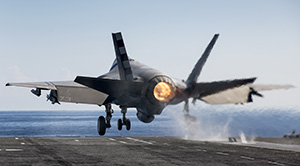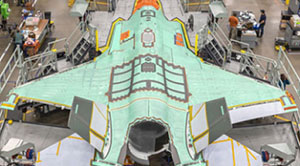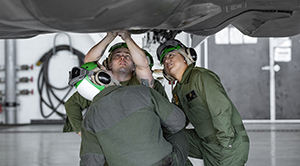The Most Economically Significant Defense Program in History, Contributing Approximately $72 Billion Annually
The F-35 helps secure our world. The program unites valued allies and partners, powers small businesses, and creates high-paying, high-tech jobs for workers in the innovation economy.
Investing in American Workers
- Annual Economic Impact: $72 Billion (based on an independent estimate by AeroDynamic Advisory)
- 290,000+ jobs
We are proud to partner with 1,900 high-tech suppliers, of which nearly 1,000 are small business corporations.
Creating the Jobs of the Future
- Artificial Intelligence
- Cybersecurity
- Software Development
Advancing the industry by ensuring workers have the expertise and skills to outpace global competitors.
Advancing the Digital Enterprise
- Digital Twin
- Model-Based Engineering
- Agile Software Development
Reducing the cost and schedule of aircraft development, operation and sustainment to set the new standard of connected protection.
F-35 FAQ
A. The F-35 is America’s most valuable and important defense program, bringing approximately $72 billion into the American economy each year.
The F-35 program is powered by a global supply chain of over 2,100 suppliers from more than a dozen countries.
A. For Production Lots 15 through 17, the average flyaway cost of an F-35A was $82.5 million; $109 million for an F-35B, and $102.1 million per F-35C.1
The F-35 team is working across government and industry for greater affordability. Lockheed Martin has significantly lowered our share of cost per flight hour over the last five years.2
“Machinists Union members take great pride in building the F-35 Joint Strike Fighter for three U.S. military services. The F-35 program creates a powerful economic impact for our nation and it produces a game-changing aircraft that keeps our fighter pilots safe. Now is the time to invest in the best air-to-air fighter by ramping up the production line to reduce unit costs and continue to handle the world’s current and emerging threats.”
–Robert Martinez Jr., President, International Association of Machinists and Aerospace Workers (IAM)


